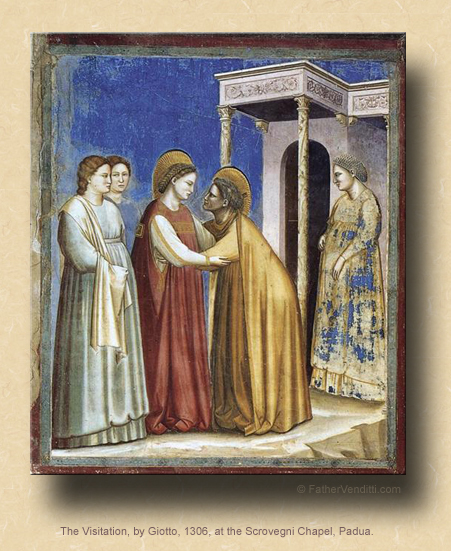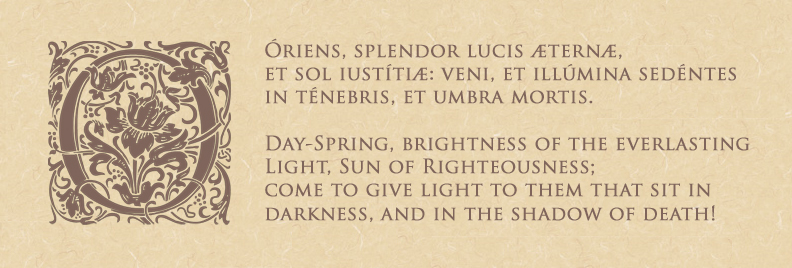She Has the Need … the Need for Speed.
The Fifth Day of the Greater Antiphons; and, the Commemoration of Saint Peter Canisius, Priest & Doctor of the Church.*
Lessons from the feria, according to the ordinary form of the Roman Rite:
• Song of Songs 2: 8-14.
[or Zephaniah 3: 14-18.]
• Psalm 33: 2-3, 11-12, 20-21.
• Luke 1: 39-45.
The Second Class Feast of Saint Thomas, Apostle; and, the Commemoration of the Fifth Day of the Greater Antiphons.**
Lessons from the proper, according to the extraordinary form of the Roman Rite:
• Ephesians 2: 19-22.
• Psalm 138: 17-18.
• John 20: 19-31.
The Thirty-First Wednesday after Pentecost, the Sixth of Philip's Fast; a Prefestive Day of the Nativity; and, the Feast of the Holy Martyr Juliana of Nicomedia.***
Lessons from the pentecostarion, according to the Ruthenian recension of the Byzantine Rite:
• James 3: 11—4: 6.
• Mark 10: 11-16.
FatherVenditti.com
|
 8:37 AM 12/21/2016 — Consider how these events leading up to Christmas Day are being presented. In the Gospel lesson of yesterday's Mass, our Blessed Mother received the news that She would be the Mother of the Savior, but included in Gabriel's message to Her is the news that Her cousin is expecting. Our Lady knows that Elizabeth is quite a bit older than She is, and we all know that a pregnancy in a woman's older years can be precarious and difficult, especially for someone who has not had children before. So, the very intuitive Saint Luke reports to us: “In the days that followed, Mary rose up and went with all haste to a town of Juda, in the hill country…” (1: 39 Knox). 8:37 AM 12/21/2016 — Consider how these events leading up to Christmas Day are being presented. In the Gospel lesson of yesterday's Mass, our Blessed Mother received the news that She would be the Mother of the Savior, but included in Gabriel's message to Her is the news that Her cousin is expecting. Our Lady knows that Elizabeth is quite a bit older than She is, and we all know that a pregnancy in a woman's older years can be precarious and difficult, especially for someone who has not had children before. So, the very intuitive Saint Luke reports to us: “In the days that followed, Mary rose up and went with all haste to a town of Juda, in the hill country…” (1: 39 Knox).
Now, on Monday we had noticed the careful attention that the Blessed Evangelist Luke gave to this first chapter of his Gospel, his marvelous facility with the Greek language with which he was raised, and his attention to the meaning of every word he uses. And there is one word in this opening verse that deserves our attention: σπουδῆς, an adverb taken from the verb σπεύδω meaning “to hasten,” from which we get our word “speed.” Our Lady proceeds “in haste.” She puts all she has at God's disposal. In an instant, all her personal plans—and no doubt she had many—were discarded so that She could do everything God wanted. She made no excuses, had no reservations, and wastes no time; but consider what She wastes no time to do.
Among the few episodes of the Gospel that refer to Her, two of them speak directly of Her attention to the needs of others. Right after receiving from Gabriel what had to be striking news for Her, She runs full steam to Her cousin to help her during what She obviously reasoned would be a difficult pregnancy for someone so up in years. Later, She would express concern to Her Son for the young couple and their guests at the wedding in Cana. Such is the temperament and solicitousness of Someone conceived without sin, without a selfish bone in Her body. No doubt Her neighbors in Nazareth could have told us about Her many little services to them over the years.
In Mary we find the truth that generosity is the virtue of great souls. Most of us, when we receive startling news that potentially changes our lives completely, retreat into ourselves: whatever we may be doing for others is put on hold because now we are the ones in need, and we look to others to give us support and consolation for a change; but, not our Blessed Mother. With haste—without a moment's hesitation—right on the heals of being told how every hope and dream for Her own future was now turned upside down, she blasts off to Her cousins house to help. Don't think for a moment that this is a natural inclination on Her part; remember, She's a human being like the rest of us, and this decision to run to Elizabeth in her need was a conscious act. Pope Saint John Paul II once said:
Far from being an instinctive inclination, love is a conscious decision of the will to draw close to other people. To be able to love truly it is important to be detached from everything and, especially, from self, to give gratuitously.… This detachment from self is the source of a balanced personality. It is the secret of happiness (Address of June 1, 1980).
Today, let us ask the Mother of God to teach us to be generous, first of all with God, then with others, starting with those with whom we live and work in the various circumstances of our lives. She will show us to set aside our own needs in favor of the needs of those around us, thus showing us that the path to true happiness lies in putting ourselves aside, as Her own Son would later say: “…He who tries to save his life will lose it; it is the man who loses his life for my sake, that will save it.” (Luke 9: 24 Knox).

* Cf. the first footnote attached to the post here for an explanation of the Days of the Greater Antiphons.
A memorial falling within the Days of the Greater Antiphons, which constitute a privileged season, automatically becomes a commemoration. Only the Collect is used, with everything else taken from the feria; the color of the season is worn. More detailed information about commemorations in privileged seasons in the ordinary form can be found here.
Born in Holland, the Jesuit Peter Canisius lived for many years in Germany where he defended the Faith by writing and teaching. He founded several Catholic colleges, and his Catechism was published in fifty-five editions in nine languages.
** In the extraordinary form during Advent, whenever a feast is observed, the feria is commemorated, but a Mass is not permitted for this commemoration; rather, the commemoration is made at Mass by an additional Collect, Secret and Postcommunion added to those of the feast. The commemoration is made at Lauds and Vespers by adding an additional antiphon, verse and Collect to those of the feast.
*** Cf. the first paragraph of the first footnote attached to the post here for an explanation of Philip's Fast. Today is the Sixth Wednesday because the season began on a Tuesday.
Juliana of Nicomedia was martyred around 299.
|

